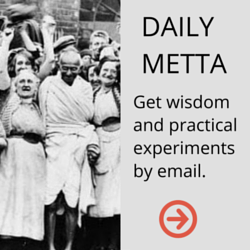July 4:
 “Real Swaraj will come, not by the acquisition of authority by a few, but by the capacity by all to resist authority when it is abused.”
“Real Swaraj will come, not by the acquisition of authority by a few, but by the capacity by all to resist authority when it is abused.”
–Gandhi (Young India, January 29, 1925)
When Gandhi met with the British Viceroy Lord Irwin after his imprisonment following the 1930 Salt Satyagraha, they shared a pot of tea. Gandhi, mischievously took out a package of contraband salt, opened it and sprinkled a bit into his cup. Looking at the astounded Lord Irwin he told him he did so in remembrance of the Boston Tea Party.
The decade leading up to the signing of the American Declaration of Independence was one of resistance and not necessarily violent resistance, either. According to an in-depth study by Walter Conser, Ronald McCarthy, David Toscano and Gene Sharp, entitled Resistance, Politics and the American Struggle for Independence 1765-1775, nonviolent resistance was more widely employed than violent resistance during that period of struggle with the British Crown. They were resisting, above all, the abuse of authority. One thing to consider, first of all, is that the American colonies established for themselves what is called in the language of nonviolent resistance a parallel government; namely, an entity for governance that exposed the illegitimacy of British Rule in the colonies. So with other tactics such as the boycott, refusing titles and honors from the Crown, denying and blocking entry into government buildings, and even spinning their own clothes (sound familiar?). Consider even these words of Samuel Adams in a letter to James Warren on May 21, 1774:
I beseech you to implore every Friend in Boston by every thing dear and sacred to Men of Sense and Virtue to avoid Blood and Tumult. They will have enough time to dye [sic]. Let them give the other Provinces opportunity to think and resolve. […] Nothing can ruin us but our Violence. Reason teaches this. (Emphasis mine)
Adams was anticipating by close to 150 years Gandhi’s dire warning that “violent revolution will bring about violent swaraj (regime).” If only we had learned that lesson!
While the United States did gain political independence on July 4, 1776, we have in a very real sense been ruined by our violence. Because propagating the myth that only violence makes us free, we went on to build a nation on the backs of slaves and stolen land that still to this day has not been able to escape its violent legacy.
But we do not need to remain ruined. If we have not learned of the nonviolent action during that century, with most historical analyses emphasizing the violent struggle, it is because we do not know how to recognize nonviolence when we see it. Nonviolence, as Gandhi said, is “as old as the hills.” We should use this Independence Day to recommit ourselves to recognizing, developing and claiming that legacy.
Experiment in Nonviolence:
Learn and share one thing today about nonviolent action during the American Revolution.
 Daily Metta 2015, a service of the Metta Center for Nonviolence, is a daily reflection on the strategic and spiritual insights of Mahatma Gandhi in thought, word and deed. As Gandhi called his life an “experiment in truth,” we have included an experiment in nonviolence to accompany each Daily Metta. Check in every day for new inspiration. Each year will be dedicated to another wisdom teacher.
Daily Metta 2015, a service of the Metta Center for Nonviolence, is a daily reflection on the strategic and spiritual insights of Mahatma Gandhi in thought, word and deed. As Gandhi called his life an “experiment in truth,” we have included an experiment in nonviolence to accompany each Daily Metta. Check in every day for new inspiration. Each year will be dedicated to another wisdom teacher.









[…] Metta Center for Nonviolence http://archives.mettacenter.org/daily-metta/american-independence-reconsidered-daily-metta/ Date: July […]